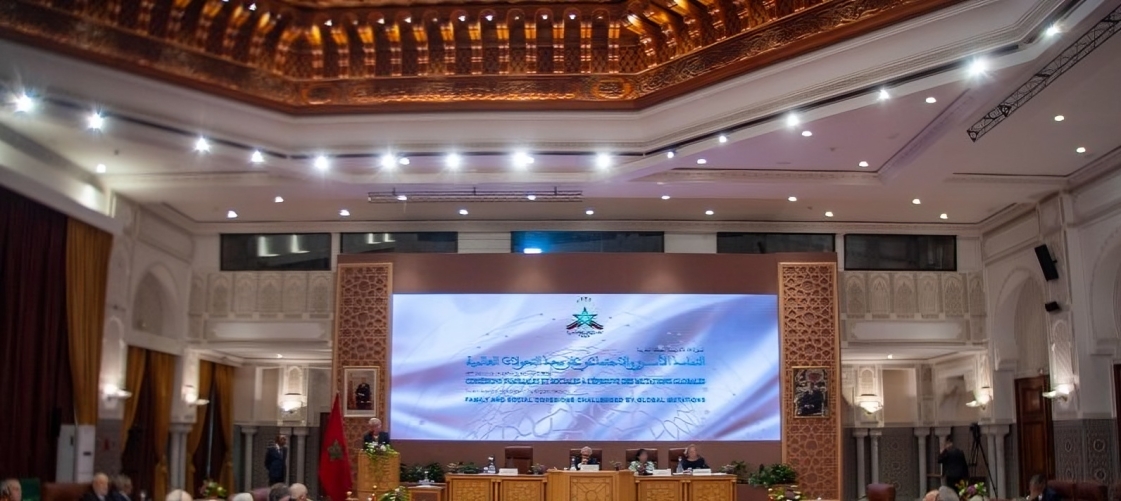Moroccan Academy Addresses Family Dynamics and Digital Era Challenges
In a thought-provoking session, the 49th gathering of the Academy of the Kingdom of Morocco convened in Rabat, bringing together experts from diverse backgrounds to explore the intricate challenges facing families in the modern world and the evolving role of digital technology in education.
The event, attended by notable figures from Morocco, Senegal, Tunisia, Portugal, Germany, and Côte d'Ivoire, provided a platform to examine family relationships within various organizational, legal, economic, and political contexts.
Abdeljalil Lahjomri, the Academy's Permanent Secretary, set the tone by highlighting the institution's mission to foster international collaboration and engage youth in academia. He discussed several notable initiatives, including the establishment of institutions dedicated to preserving Moroccan heritage, such as the preservation of Al Malhoun music, and the organization of a piano competition to nurture young talents and encourage artistic expression.
Addressing the evolving concept of family, Angelika Nussberger, a legal expert from Germany, emphasized the need for legal protections for diverse family structures. She cited examples such as LGBTQ+ families and children born through surrogacy. Nussberger, a professor of law and scholar of Slavic studies, advocated for using the European Convention on Human Rights as a framework to ensure equality and non-discrimination within family law.
Reinforcing Nussberger's comments, Moroccan sociologist Rahma Bourqia examined the complex relationship between family dynamics, cultural traditions, and legal frameworks. She highlighted the necessity of adapting family laws to accommodate societal changes, particularly in Islamic societies where traditional interpretations may no longer fully align with contemporary realities.
Offering a critical perspective, Ivorian poet and novelist Tanella Boni questioned traditional notions of maternity and paternity, advocating for a more nuanced understanding of familial bonds and gender roles. Boni expressed concerns about the impact of war and social upheaval on family dynamics, calling for greater introspection and dialogue within societies.
Switching focus, former Deputy Prime Minister of Portugal, Paulo Portas, explored the ethical implications of digital technology, particularly artificial intelligence (AI), in academia and society at large. He raised concerns about the integrity of academic research in the age of AI and warned against the polarizing effects of social media addiction.
Tunisian politician Faouzia Charfi centered her discussion on the role of technology in education and its implications for social equity and academic achievement. She emphasized the importance of integrating technology into the classroom while addressing biases in algorithms and safeguarding personal data, underlining the need for comprehensive digital literacy programs.
Senegalese philosopher Souleymane Bachir Diagne stressed the significance of parental involvement in education, particularly in supporting girls' access to schooling. He emphasized the role of families in guiding students across various disciplines, including the humanities, and promoting academic excellence. He highlighted the importance of equitable access to education as a cornerstone of social progress and empowerment.
The Academy's session served as a thought-provoking platform, tackling the multifaceted challenges facing families and the transformative impact of digital technology on education. It underscored the need for open dialogue, legal reforms, and responsible integration of technology to foster social cohesion and academic excellence.

-
14:50
-
14:20
-
14:00
-
13:50
-
13:40
-
13:20
-
13:00
-
12:50
-
12:30
-
12:20
-
12:00
-
11:50
-
11:50
-
11:30
-
11:20
-
11:00
-
10:50
-
10:30
-
10:20
-
10:00
-
09:50
-
09:30
-
09:20
-
09:00
-
08:50
-
08:30
-
08:20
-
08:00
-
07:50
-
07:45
-
07:30
-
07:15
-
07:00
-
19:20
-
18:50
-
18:30
-
18:20
-
18:00
-
17:50
-
17:30
-
17:20
-
17:00
-
16:50
-
16:45
-
16:30
-
16:20
-
16:12
-
16:00
-
15:50
-
15:41
-
15:30
-
15:20


